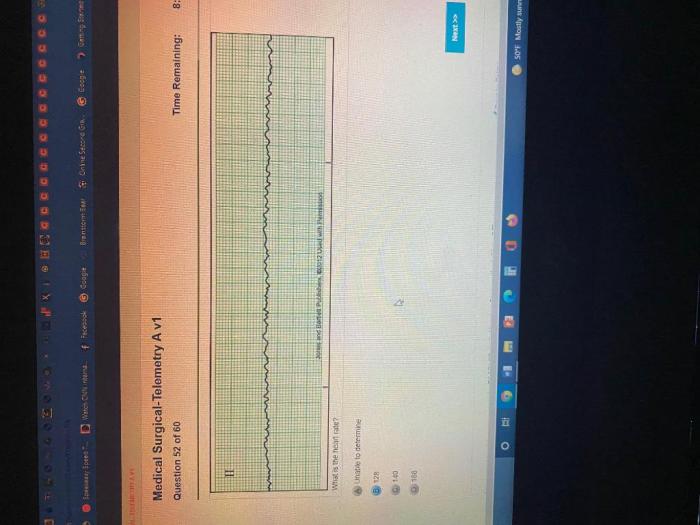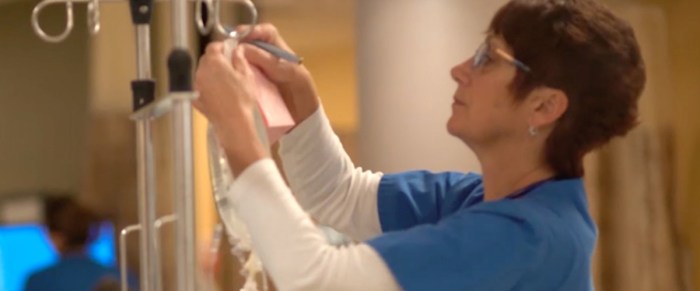Medical surgical telemetry rn a relias – The medical surgical telemetry RN plays a critical role in providing comprehensive care to patients in telemetry units. This specialized nurse utilizes advanced monitoring equipment and expertise to continuously assess and intervene in the care of patients with complex medical conditions, ensuring their well-being and improving patient outcomes.
Telemetry units are dedicated healthcare settings equipped with sophisticated monitoring systems that allow for real-time surveillance of patients’ vital signs and other physiological parameters. Registered nurses (RNs) in these units are highly trained in interpreting telemetry data, recognizing subtle changes in patients’ conditions, and implementing timely interventions.
Medical Surgical Telemetry Unit Overview: Medical Surgical Telemetry Rn A Relias
A medical surgical telemetry unit (MSTU) is a specialized healthcare unit within a hospital that provides continuous monitoring and care for patients with cardiovascular, respiratory, or other conditions that require close observation.
Telemetry units are typically staffed by registered nurses (RNs) who are specially trained in cardiac monitoring and emergency care. They provide comprehensive care for patients with conditions such as arrhythmias, heart failure, acute coronary syndrome, and respiratory distress.
Role of the Registered Nurse (RN) in a Telemetry Unit
- Monitor and assess patients’ vital signs, including heart rate, rhythm, blood pressure, and respiratory rate.
- Interpret telemetry data and identify any abnormalities or changes in the patient’s condition.
- Provide timely interventions and treatments as needed, such as administering medications, performing CPR, or calling for medical assistance.
- Educate patients about their condition and treatment plan.
- Collaborate with other healthcare professionals to ensure optimal patient care.
Monitoring and Assessment

Monitoring Equipment Used in a Telemetry Unit
- Electrocardiogram (ECG) monitors: Continuously record the patient’s heart rhythm and electrical activity.
- Pulse oximeters: Measure the patient’s oxygen saturation levels.
- Blood pressure monitors: Measure the patient’s blood pressure.
- Respiratory monitors: Monitor the patient’s respiratory rate and effort.
- Telemetry transmitters: Wireless devices that transmit patient data to a central monitoring station.
Importance of Continuous Monitoring and Assessment
Continuous monitoring allows healthcare providers to:
- Detect changes in the patient’s condition early on.
- Prevent or minimize complications.
- Provide prompt treatment when necessary.
- Improve patient outcomes.
Types of Telemetry Data Collected
- Heart rate and rhythm
- Oxygen saturation levels
- Blood pressure
- Respiratory rate and effort
- Activity level
Nursing Interventions

Importance of Early Detection and Intervention
Early detection and intervention in telemetry patients is crucial to prevent or minimize complications. RNs play a vital role in:
- Identifying any abnormalities or changes in the patient’s condition.
- Providing timely interventions and treatments as needed.
- Educating patients about their condition and treatment plan.
Common Nursing Interventions in a Telemetry Unit
- Administering medications
- Performing CPR
- Calling for medical assistance
- Educating patients about their condition and treatment plan
- Providing emotional support to patients and their families
Patient Education
Importance of Patient Education
Patient education is essential in a telemetry unit to ensure that patients understand their condition and treatment plan. This includes:
- Explaining the purpose and importance of telemetry monitoring.
- Educating patients about their specific condition and treatment options.
- Teaching patients how to recognize and report any changes in their condition.
Role of the RN in Educating Patients
RNs play a key role in educating patients by:
- Providing clear and concise explanations about the patient’s condition and treatment plan.
- Answering patients’ questions and concerns.
- Using visual aids and other educational materials to enhance understanding.
Patient Education Materials and Strategies
- Patient handouts and brochures
- Videos and online resources
- Group education sessions
- One-on-one teaching
Interdisciplinary Collaboration

Importance of Interdisciplinary Collaboration, Medical surgical telemetry rn a relias
Interdisciplinary collaboration is essential in a telemetry unit to provide comprehensive and coordinated care for patients. This involves:
- Working closely with physicians, cardiologists, and other healthcare professionals.
- Sharing patient information and discussing treatment plans.
- Coordinating care and ensuring a smooth transition between different healthcare settings.
Roles of Other Healthcare Professionals
- Physicians: Diagnose and treat patients’ underlying medical conditions.
- Cardiologists: Specialize in the diagnosis and treatment of heart conditions.
- Respiratory therapists: Manage patients’ respiratory care.
- Pharmacists: Ensure the safe and effective use of medications.
Examples of Interdisciplinary Collaboration
- Consulting with a cardiologist to determine the best treatment plan for a patient with an arrhythmia.
- Collaborating with a respiratory therapist to manage a patient’s oxygen therapy.
- Working with a pharmacist to review a patient’s medication regimen and make any necessary adjustments.
FAQ Insights
What is the primary role of a medical surgical telemetry RN?
The primary role of a medical surgical telemetry RN is to monitor and assess patients’ vital signs and other physiological parameters, detect changes in their conditions, and intervene promptly to prevent or manage complications.
What types of patients are typically cared for in a telemetry unit?
Patients in telemetry units typically have complex medical conditions, such as cardiac arrhythmias, heart failure, respiratory problems, or other conditions requiring close monitoring and prompt intervention.
What are the key nursing interventions in a telemetry unit?
Key nursing interventions in a telemetry unit include continuous monitoring of vital signs, arrhythmia recognition and management, administration of medications, wound care, and patient education.